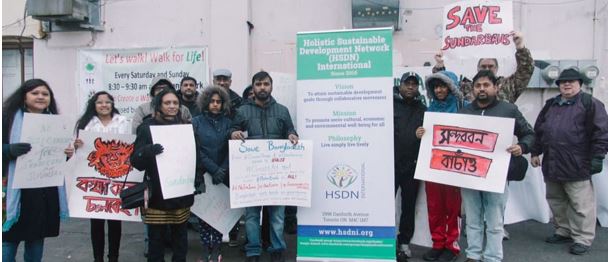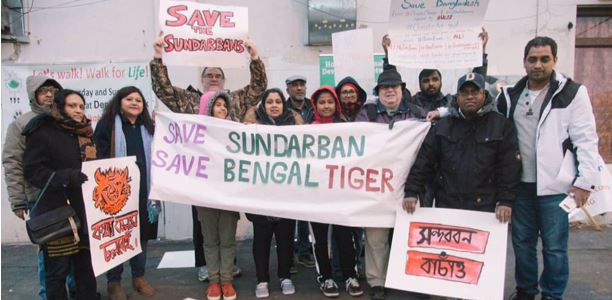The joint project of PDB (Bangladesh) and NTPC (India) for 1320 MW Rampal coal-fired power plant has become a deadly threat for the survival of Sundarban which is inviting a range of national and international vested interest groups to grab forest and set up hundreds of commercial projects in and around the Sundarbans. This has not only put the livelihood of at least 3.5 million people at risk, it has made the lives of around 40 million coastal people vulnerable to natural disasters as the Sundarbans have also been a huge natural safe guard against frequent cyclone, storm and other natural disasters in the country. Bangladesh is one of the most vulnerable country facing climate change.
The Sundarbans, to preserve its outstanding universal value, now demand global public action for its survival. he forest has been playing unparallel protective and productive functions. In addition to its role as natural safeguard, it is also the single largest source of forest produce in the country. Quoted from Prof. Anu Mohammed, The Sundarbans also plays an important role in creating economic value in the national economy and employment creating opportunities for the millions. It now covers more than 60% of the total reserved forest of Bangladesh, contributes about 50% of total forest revenue.

HSDN International and Bangla School Toronto stands in solidarity with Global Day of Action to save the Sundarban and calls on the government of Bangladesh to scrap the Rampal Coal plant. The event held on November 11, 2018. Besides many other organizations and individuals, HSDN International believe that the Rampal Coal plant is a big game of capitalist bureaucrats and their corrupted politicians and businessmen.

The joint project of PDB (Bangladesh) and NTPC (India) for 1320 MW Rampal coal-fired power plant has become a deadly threat for the survival of Sundarban which is inviting a range of national and international vested interest groups to grab forest and set up hundreds of commercial projects in and around the Sundarbans. This has not only put the livelihood of at least 3.5 million people at risk, it has made the lives of around 40 million coastal people vulnerable to natural disasters as the Sundarbans have also been a huge natural safe guard against frequent cyclone, storm and other natural disasters in the country. Bangladesh is one of the most vulnerable country facing climate change.
The Sundarbans, to preserve its outstanding universal value, now demand global public action for its survival. he forest has been playing unparallel protective and productive functions. In addition to its role as natural safeguard, it is also the single largest source of forest produce in the country. Quoted from Prof. Anu Mohammed, The Sundarbans also plays an important role in creating economic value in the national economy and employment creating opportunities for the millions. It now covers more than 60% of the total reserved forest of Bangladesh, contributes about 50% of total forest revenue.
One of the organizers Fatin Chowdhury mentioned that coal cannot be a solution for climate justice. The latest IPCC report has resoundingly called for transition away from fossil fuels in order to strive for the 1.5 C target limit, a necessary goal for countries like Bangladesh in the Global South who will experience the worst impacts of climate change.
As we stand together to call for climate justice in Bangladesh, we connect the struggles of communities worldwide. We realize the role fascist states play in continuing to exploit our resources to advance their colonization. In retaliation, we envision alternative worlds that include us all.
Our fight to save the Sundarban is connected to all these struggles, and wins.
HSDN International and Bangla School Toronto stands in solidarity with Global Day of Action to save the Sundarban and calls on the government of Bangladesh to scrap the Rampal Coal plant. The event held on November 11, 2018. Besides many other organizations and individuals, HSDN International believe that the Rampal Coal plant is a big game of capitalist bureaucrats and their corrupted politicians and businessmen.
One of the organizers Fatin Chowdhury mentioned that coal cannot be a solution for climate justice. The latest IPCC report has resoundingly called for transition away from fossil fuels in order to strive for the 1.5 C target limit, a necessary goal for countries like Bangladesh in the Global South who will experience the worst impacts of climate change.
As we stand together to call for climate justice in Bangladesh, we connect the struggles of communities worldwide. We realize the role fascist states play in continuing to exploit our resources to advance their colonization. In retaliation, we envision alternative worlds that include us all.
Our fight to save the Sundarban is connected to all these struggles, and wins.

